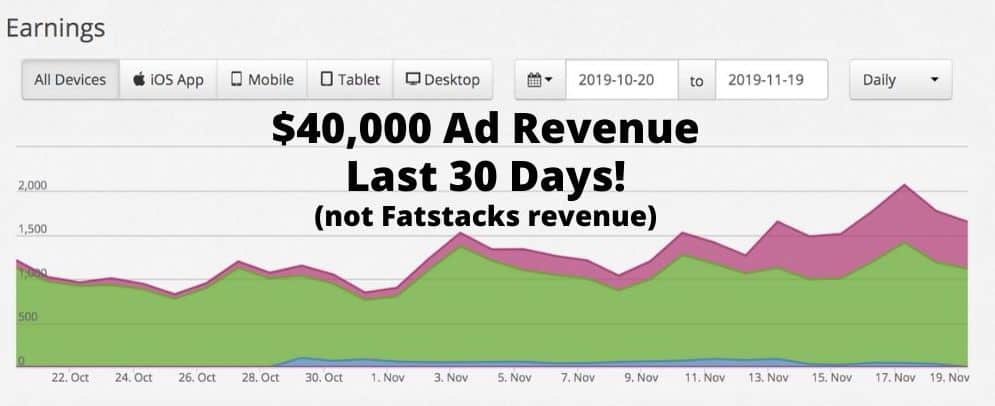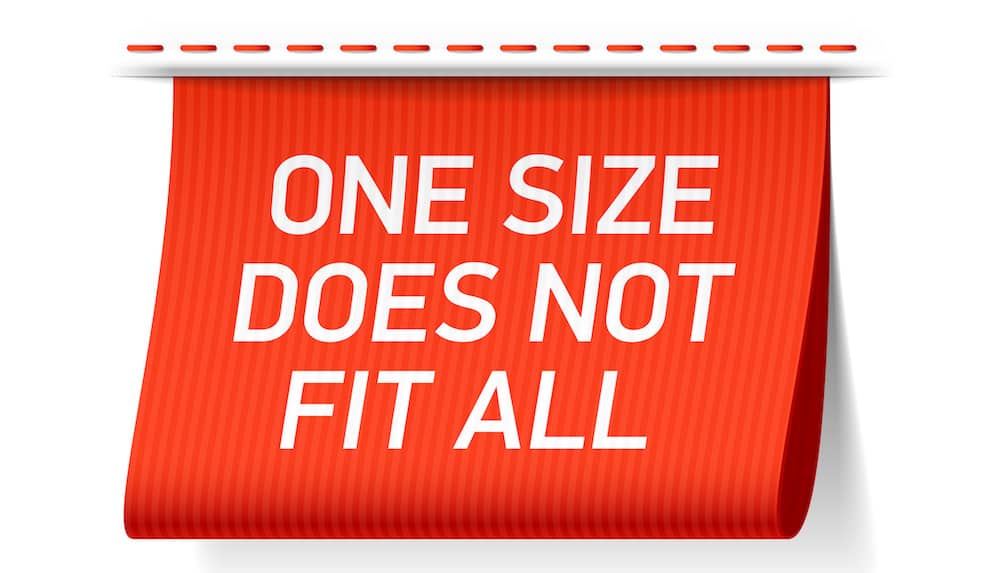Podcast Version
I’m biased because I have an online business.
You can bet your bottom dollar that the best online business to start that I’m going to tell you is the type I run.
What kind of online business do I run?
In a nutshell it’s an online publishing business made up of 9 website properties, 3 email newsletters and a myriad of social media channels (connected to said websites).
My product is content.
I earn from ads and affiliate promotions. One exception is on this site where I sell some courses.
The name of the game is quality traffic; specifically growing it.
The more quality traffic I attract, generally the more revenue my business earns.
While I’m clearly biased in suggesting that starting an online business is the best best online business to start, there are very solid objective reasons to back me up. Moreover, hundreds of thousands of people are interested in this business model so there must be something to it.
Don’t let the naysayers deter you.
Consider this:
About 2 years after I went full time as a blogger and website publisher I was watching the TV show Californication.
It’s a decent show. Pretty funny. David Duchovny pulls of the smarmy, pretentious, cool writer well.
Duchovny’s character is a writer with some success behind him but in the show he struggles to come up with another big success.
His agent or manager suggests that he leverage his celebrity and start blogging for various outlets.
Duchovny’s character smarts at the suggestion because blogging is beneath him considering it an amateur writer’s pursuit.
I could see how a successful published writer could hold such an attitude toward blogging. I didn’t take offense of course, but I think these days successful bloggers are respected in their own right. Ariana Huffington, Seth Godin, Tim Ferriss to name a few are very well respected.
There are a myriad of bloggers in niches who are well respected (and earn well).
Even celebrities and business leaders blog here and there on various platforms.
While I don’t read personal websites of authors, fiction and non-fiction alike, I suspect many of them blog for promotional reasons as well.
The point is that while it’s easy to besmirch blogging, it’s now an accepted medium embraced by many respected writers.
In fact, many bloggers who started with nothing now earn millions per year.
I’m both a blogger and niche site publisher, and while I don’t earn like the bloggers on the Forbes list of highest earning blogs, I earn a full time living for which I’m grateful every day.
Which brings me to the topic du jour… the best online business to start.
What is an online publishing business?
It”s a fancy way of saying a blog or niche website. I happen to own several profitable niche sites so it’s a growing publishing business.
Generally, these sites are “content sites” monetized with display ads, affiliate offers and/or selling digital products.
I differentiate it from an ecommerce or email newsletter based business because they are unique, but the lines are blurred often. Take an ecommerce site that sells sneakers. Most ecommerce site owners are also content publishers. They run blogs with articles on the same site in an effort to attract prospective customers.
Email newsletter based businesses usually have a content site attached which is what attracts email subscribers.
The point is that most forms of online businesses include a content marketing business.
However, I liken myself more of a publisher than a marketer. I don’t sell anything on my content sites. I merely publish content which is an end in itself. I monetize that content with display ads and some affiliate links.
Ecommerce site owners and email newsletter publishers use the content as a means to an end. They use content for marketing while I don’t.
How do you start an online publishing business (aka blog)?
It starts with a single site. You can stick with one site or add more sites, although I don’t recommend adding a second site until the first site is earning plenty of money and you can outsource much of the work.
As for the nuts and bolts of starting a niche site or blog, I recommend you read my extensive article that steps you through “how to start a blog and make money“.
How does this type of online business make money?
There are 3 main ways for an online publishing business to make money.
I should say there are 3 main strategies.
I set out the three main strategies on how to make gobs of money blogging here. For a more extensive website monetization discussion, check out my epic list of 47 ways to monetize a website.
15 Reasons to Start an Online Publishing Business (Pros)
1. Pursue a passion
This is by far and away the biggest reason publishing blog(s) rocks. I love it. Pure and simple. I enjoy going to work. I think about my blogs when not working. I love reading blog industry news and trying new things. I love the challenge and the fact I’m able to be analytical and creative every day.
Without a doubt I couldn’t have fallen into a more enjoyable business model. Yes, blogging is indeed a business.
2. No earning limit
While as a blogger there is practically speaking an earning limit; technically speaking, there’s no limit. It’s not like as a blogger I’m in some lock-step remuneration program that many jobs have.
If I’m smart and work hard and make a site a success it can generate “hyper financial rewards.” Hyper financial rewards is earning income well beyond what one would expect for remuneration.
A good example of hyper rewards are movie stars that hit the big time. Once celebrity status is achieved, they can command hyper-inflated fees for their work.
No earning limit is inspiring and motivating. It drives me to think up ways to improve all of my websites where revenue is one of several success markers.
Here are a couple of screenshots of ad revenue from one of my blogs:


3. Meet great, like-minded folks
The internet marketing community is great. There are many great folks who are generous with their time and knowledge. I’ve learned so much Skyping and emailing many such folks who are now friends.
It’s been a real bonus getting to know these people.
The thing is I’m very much a lone wolf. I don’t intentionally network. I’m not on a mission to meet influencers or get to know hordes of bloggers. However, simply being even a little involved has resulted in meeting many great people in the industry.
TIP: If you wish to meet other internet marketers, starting a “How to blog” or “how to make money online” website helps a lot. Until Fat Stacks, I wasn’t very plugged in, but then I didn’t make an effort either. These days Facebook Groups are a great way to network within the community.
4. No barriers to entry
Anyone can start a blog. There are free hosting options such as blogger, Tumblr and WordPress if one has not one spare cent.
I think it’s amazing that it’s an opportunity available to anyone. You don’t need a degree, certification or any credentials (unless you enter niches that really should have credentials).
Now I know many people have challenges. It may be an inability to write in English. While people can write in their native language, the fact is that the most lucrative markets are English speaking markets.
Also, blogging is writing. Not all people are good writers. That said, with some investment in hiring writers, the barriers to entry is still very low.
5. Unrestricted Autonomy
I can eat lunch when I want. I can start when I want. I can go to the gym when I want. I can call it a day when I want. I love these perks, but succeeding online as a blogger and publisher is demanding and a lot of hard work.
While it is a lot of work, it’s a fact that having high levels of autonomy increases job satisfaction. In fact, once financial needs are met, autonomy is more important than more money for job satisfaction.
There are few jobs or even businesses that offer more autonomy than being a blogger. Bloggers in the strict sense have no clients and do not need to keep certain hours. Sure, there may be the odd conference call or skype session, but otherwise what I do with my time is totally up to me.
6. Unleash Creativity
I’m not creative in the artistic sense. I can’t draw, paint or design anything. I’m so bad, I use WordPress themes as-is. If I need it purtier, I hire someone.
However, running a blogging business does require a certain type of creativity. One must dream up content ideas, write the content, promote the content… all of which requires its own kind of creativity.
7. Class is in session
Most blogs, in some form or another, include a teaching or informing aspect. Whether it’s a niche site on pets, automobiles, fashion or a current events site, as a blogger, you’re teaching and/or informing people.
True story. I very nearly became a teacher. I was a substitute teacher for one year to give it a shot. I enjoyed it a lot, but at the end of the day chose the legal profession. It was a tough choice because I find teaching very fulfilling.
8. Opinions are like A%$-H%@^$, Everyone Has One
I love that saying. I keep it clean around here (although I enjoy well-used colorful language), but that quote pretty much sums it.
As a blogger, you get to opine on anything as much as you want. Your readers may disagree, but that’s cool. You can’t please all the people all the time.
It’s fun being able to opine on whatever we like. I enjoy it. Every post includes some form of opinion, preference, etc. It’s impossible to write content without injecting personal views and opinions.
9. Free Stuff
I get offered free stuff via my niche sites as well as free software as a result of publishing Fat Stacks.
I don’t ask for it. I don’t make it a prerequisite to write a review. I write about products I buy as a bona fide customer. Nevertheless, when offered, I’ll accept if I think I’ll use it or it’s worth writing about.
I’m not really into stuff. I prefer minimalism (within reason). I do like nice clothes though, which makes me think I should start a fashion blog for guys. I wouldn’t mind free apparel.
I am, however, a software junkie. I love trying new software. I pay for a lot of software each month, some of which I use daily and some of which not as much as I should.
Again, I don’t ask for free subscriptions opting to pay full price for stuff I use.
10. Celebrity?
Fat Stacks isn’t that popular, even in the IM space. It gets decent traffic and I’ve met a lot of great folks/readers/commenters, but I’m by no stretch a guru or celebrity. I don’t really aspire for that. I’m a lone wolf; I don’t seek the spotlight.
However, being in the spotlight is something some people like and aspire for. In that case, blogging can be a launchpad for that. Think Perez Hilton, Tim Ferriss (he’s also a best-selling author), Ariana Huffington to name a few.
Within the IM community there are some very popular bloggers/podcasters verging onto mainstream celebrity. Think Pat Flynn of Smart Passive Income, Jeremy Shoemaker, Ryan Deiss of Digital Marketer, Frank Kern, Syed Balkhi, Brian Clark, Darren Rowse, just to name few who are celebrities within the IM community. While they’re not at the celebrity level of Jennifer Aniston or George Clooney, they’re well known and recognized within their sizeable audiences.
11. Get published
Many bloggers in a variety of niches have been offered book deals because of their blogs. This happens in food/recipe niches. Once a blogger has a huge audience, the big publishers offer a book deal because chances are that book will sell well out-of-the-gates.
One example is Smittenkitchen.com (a terrific recipe blog, BTW).
I have no desire to publish a book, but would consider it if asked (which is unlikely). It’s not in my bucket list, but I’m always open to opportunities.
12. Get paid quickly and regularly (clockwork)
Some business models have a huge delay between spending money and getting paid. While this is also the case when starting out blogging (you invest time and money hoping it pays off down the road), once you start earning, you get paid quickly. AdSense and most affiliate networks pay the following month. If you sell stuff, you get paid immediately. Generally, the lag time between triggering revenue and getting paid is fast and consistent.
Consistent payments sent out on the same date each month are also important because you can count on it and plan for it. It makes my bookkeeping and paying myself so easy I just have to all that books stuff once a month.
With many other businesses, you’re at the whim of customers and clients. Trades, professionals (lawyers), contractors, etc. often never know when they’ll get paid. Sometimes you have to chase them for months to get paid. Sometimes you never get paid.
Chasing money or getting stiffed is rare as a blogger since most established ad networks and affiliate networks don’t stiff their customers.
13. Residual/passive income
This is a biggie and makes it possible to earn great sums of money.
As a blogger and niche site publisher, you make money on work you did previously. I have published articles that are 5 years old still earning good money every month from ads and affiliate promotions. In fact, my highest earning content is a year plus old because it often takes a while to climb the SERPs.
If you’re a blogger, as your reputation grows, so too can your income. You establish trust with an audience. In turn your audience grows. You basically leverage your content to grow your rep which grows your income.
Moreover, I promote several merchants that pay recurring commissions. Recurring commission streams can grow significantly over the years. Currently, I earned $7,500 to $10,000 per month from recurring commissions. It takes a while, but once established, it’s a terrific income stream.
14. Build an asset you can sell
This is an amazing benefit of building up profitable web properties. Most digital assets with cash flow can be sold. Content sites typically sell for 2 to 4 times net annual income. It’s the retirement package; a pension if you will. If you grow your monthly net income to $30K per month, you can likely sell it for $1 million. While some jobs offer decent pensions, fewer and fewer of them do.
Moreover, compared to other businesses, web assets are fairly liquid due to the large and growing demand. It’s not easy selling a local trades company or law firm. You have a very small pool of buyers. Websites, on the other hand, have a global pool of buyers. As long as you’re not asking for ridiculous amounts of money, you can typically sell a website fairly quickly (a couple of weeks to a few months).
15. The usual collateral benefits
This kinda ties into unrestricted autonomy, which is a very powerful benefit, but having done this for a few years, here’s a laundry list of collateral benefits to owning a successful online publishing business:
- No boss, clients or customers: If you publish content sites you don’t have a boss, clients or customers. This is why I publish content sites instead of selling services – I’m not really into having clients or customers because that’s like having multiple bosses.
- Book time off any time you want: I never have to worry about getting time off for any vacation or last-minute things that come up. For example, we’ve been invited to vacation with friends in the past. I never had to worry about whether I could get the time off. We just say “you bet, would love to, when is it?”. It’s never a problem attending various kid events, parent/teacher interviews etc. You have full control over your schedule.
- Work hours that are optimal for you: This is more important than it may seem. I believe each person has optimal working hours during the day. Night owls get more done later in the day. Early birds get more done early in the day. As an online publisher, you can work when it best suits you.
- Easier to stay healthy: This flows from schedule flexibility. I can workout when I want and regularly. Sometimes I do a quick 20 minute workout and other times much longer. In the long run, I consistently do something active most days. This is hard to do when working a 9 to 5 (which these days is more like 8 to 6).
What really motivates you?
There is no doubt that blogging and publishing websites is not for everyone.
Sure, the collateral perks rock, but money, setting your own schedule, working anywhere you want are not sufficient motivation to make a go of it.
It’s been my experience that loving this work is important to succeed. I love writing, analyzing data and coming up with ways to attract traffic and create awesome websites. Plainly put, I love this stuff.
Yeah, the money is great and being able to work where and when I want is nice, but at the end of the day, whether I start at 11 am (I usually start at 7:30 am) and work on the beach (I don’t work on the beach but I could), the fact is this stuff is work and you either love the work or you don’t.
Cons of starting an online publishing business (aka blog)
It’s not all sunshine and butterflies. Here are some cons of starting an online publishing business.
It’s boring
Most businesses invlve a lot of boring, tedious work. Boring makes money.
I wrote about it the boring angle in detail here.
It’s risky
Starting any business is risky. There’s a good chance it won’t work. The same is true with an online publishing business.
Also like other businesses, it’s risky even if it’s thriving. There are many variables beyond your control that can wipe you out overnight. You’re living on the edge.
If Google overhauls the search algo, you could lose much of your website traffic inside 24 hours. It’s happened to many publishers.
If you end up getting loads of traffic from a social network, that social network could tweak it’s algo and turn off the traffic spiggot.
It’s painfully slow-going
You have to realize that getting a blog or website to $10K per month profit takes a long time. I’m talking a couple to a few years. Some people do it faster, but don’t count on it.
There’s a lot to learn. Moreover, a content business requires lots of content. That doesn’t happen overnight either.
It helps if you have extra money to invest, but even then, it takes time.
It’s not like opening a coffee shop in a busy area where you can generate plenty of sales and cashflow instantly. This online publishing biz takes time to grow traffic and profits.
It’s lonely work
This can be a pro or a con, depending on your personality. Some people enjoy work environments with other people around. Some people, like yours truly, prefer working solo all day.
Is this type of business for you?
Fortunately, it costs little to find out.
Register a domain for $15, get hosting and give it a shot. Try it for two or three months. If you get hooked, it’s a winner. If you find yourself dragging your heels to the computer, give it up.
Now, just because you like it doesn’t mean you’ll succeed. Remember, it is risky. It took me nearly 2 years to earn money. That’s a long haul. Most people take quite a while for lift off assuming they stick with it weekly.
Just like any business, you really need to want it and like it. Chances are you’re working another job so you won’t have much time for it in the beginning. That means dedicating your spare time to it. In order to do that in the long run, you really need to like and want it.

Jon Dykstra is a six figure niche site creator with 10+ years of experience. His willingness to openly share his wins and losses in the email newsletter he publishes has made him a go-to source of guidance and motivation for many. His popular “Niche site profits” course has helped thousands follow his footsteps in creating simple niche sites that earn big.







That was really an important topic you explored my dear friend , today people are achieving the dreams just because of blogging so i think every one should take blogging seriously,
You are doing best work for bloggers. Keep it up. This is from Ankit, founder of BeingMotivate.com
Love your blog – you’ve updated it since I started reading your stuff last year and now I can’t find the article on where you place adsense ads anymore. Can you post a link to it below?
Great article Jon, thanks for the share.
I have one question.
What were the major obstacles in in your blogging career that you faced?
Kind regards,
Filip
Figuring out what works for me. It’s trial and error. I still find that it’s trial and error with respect to figuring out what content topics I should target. I too often ignore metrics and instead publish content that I will probably never rank for but do so because it’s cool or it’s just something I want on the site. I’ve been spending that last 3 months digging in with ahrefs and Analytics and have noticed some great topics across a few of my sites that I ignored but I already do well with and could do so much better if only I put more effort on those topics. Anyway, that’s a current obstacle. I’d also say niche selection is tricky. I’ve started plenty of sites that never went anywhere… but fortunately I started a few that do well.
Hi, Jon! That’s a great article! I agree with most of it. It just seems too good to be true, though. The landscape is not what it was a few years back. Now, the competition is more fierce, and “passion” doesn’t always cut it. But I do agree with all your points. It feels great that I have the freedom to do whatever I want with my blog as it is my own business and I run it whichever way I like (with respect to my target audience, of course.) Not everyone can say that they are free to do whatever they like with their business, only a handful. Bloggers are one of them!
wow. what a nice post. i love it
Thanks for sharing such a detailed info to start a niche blog.